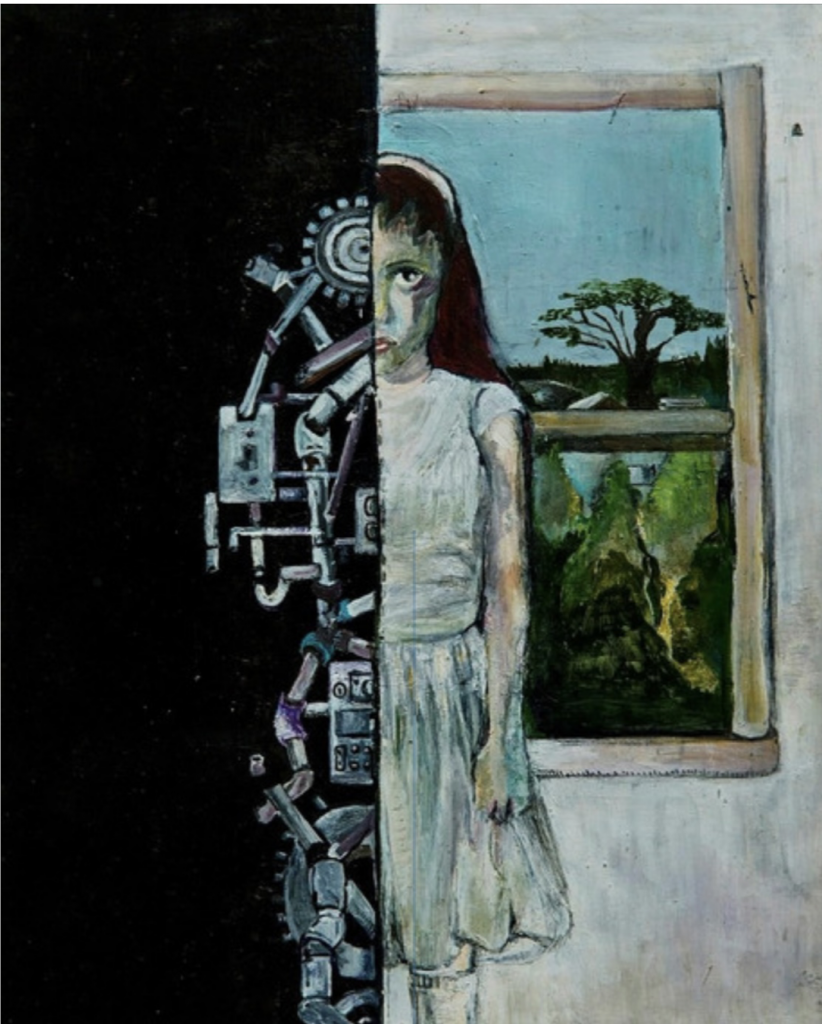Macarthur Station, 25x25, Acrylic on Canvas
The American school system’s relationship with the arts has been complicated, to say the least. American public schools are notoriously underfunded, and with many schools already struggling to pay their teachers a decent wage, the arts are frequently the first programs cut. Since the housing crisis in 2008, many schools have had to drastically reduce their arts programs due to nationwide budget cuts and a focus on math and science testing. Unfortunately, a large percentage of the American public believes that the arts are non-essential and do not offer students any real-world skills or educational benefits. Lorelei Linklater, an artist, children’s educator, and actress best-known for her performance in the 2014 drama Boyhood, recognizes first-hand the importance of the arts in education. An active member of both the acting and arts community, Lorelei Linklater spent much of her childhood within different school art programs before eventually attending California College of the Arts, where she received a BFA in painting in 2015. Since graduating, Lorelei Linklater has become a celebrated multi-media painter.
![]()

The Other Side, 11 x 14, Oil on Canvas
Lorelei Linklater credits her middle and high school art programs as a major factor in her career and believes the arts offer students essential behavioral and educational benefits.
Academic Benefits
Today, 91% of Americans believe the arts are a crucial aspect of a well-rounded education. In addition to reported connections between students who take an art class and overall higher grades, there are a variety of other academic benefits that have been documented in recent studies. Recently, research has shown a connection between music education and improving verbal memory, second language pronunciation, and reading ability (frontiers in Neuroscience). In various studies, researchers have concluded that arts education’s unique ability to immerse students in a wide range of different subject matters can build a wide range of understanding. One such example can be found in students performing Shakespeare in a classroom setting. To recite a sonnet more accurately, students must be able to understand the social, historical, and cultural events that took place during the play’s setting.
Perhaps the most common problem many educators face is motivating students. To truly grasp a subject and progress in their education, they must be internally motivated to connect with the material. Motivation can be broken down into extrinsic and intrinsic motivation. Extrinsic motivation comes from external factors and is often an incentive such as money, praise, or in the case of education - high grades. Intrinsic motivation is a motivation that is driven by internal reward or simply because the person wants to. Extrinsic motivation can motivate a student so far as they care about a grading system or other external reward. Studies have shown that students exposed to the arts have a greater amount of intrinsic motivation regarding not only their art classes but academic classes as well. To improve student engagement, students must be given opportunities to build meaningful connections with their schoolwork and develop their own intrinsic motivation.
American Psychological Association Study
In the past, many studies have been done on the connection between musical trading and its impact on IQ, reading ability, mathematics, and spatial-temporal ability. While these studies provided evidence for the value of arts education, students from varying socio-economic backgrounds were rarely included in the study’s sample size. In response, the American Psychological Association published a
study not only addressing these limitations but conducted its own study, which followed more than 30,000 students from different socio-economic backgrounds over a ten-year period. In order to combat a potentially skewed study, the American Psychological Association focused on a diverse population of students, which included Latino students (61%), English Language Learners (55%), African American Students (32%), and free/reduced lunch students (81%). Compared to students who did not participate in art elective courses, the study found that students who did participate in an arts elective course had higher overall GPAs, a lower chance of suspension, higher scores in reading, and better scores in math.
Behavioral Benefits
Communication
The ability to communicate effectively and clearly is perhaps one of the most essential skills for young adults to develop. From professional life to personal life, our modern world relies on communication. To be prepared for adult life, it is paramount that students are taught communication tactics and empathy throughout their education. One of the most effective ways students can be exposed to a multitude of communication tactics is through the arts. Within music alone, students must learn verbal, non-verbal, and emotional communication to more closely connect with the written music, their peers, and the conductor. While the arts can be considered its own form of expression, students must express their thoughts and emotions through varying forms of communication to communicate within an artistic space.
Deepening Cultural and Self-Understanding
One of the most significant ways the arts help students learn and expand their understanding is through exposure to other cultures. Theater, music, and visual arts one some of the founding principles of culture. Students can develop a greater understanding of cultures they would normally have never learned about in their other academic classes through the arts. Arts and culture provide students a platform for learning about different cultures in both a historical and art-centered context.

Portrait of Mae, 20 x 20, Acrylic on Canvas

Macarthur Station, 25x25, Acrylic on Canvas
 The Other Side, 11 x 14, Oil on Canvas
Lorelei Linklater credits her middle and high school art programs as a major factor in her career and believes the arts offer students essential behavioral and educational benefits.
Academic Benefits
Today, 91% of Americans believe the arts are a crucial aspect of a well-rounded education. In addition to reported connections between students who take an art class and overall higher grades, there are a variety of other academic benefits that have been documented in recent studies. Recently, research has shown a connection between music education and improving verbal memory, second language pronunciation, and reading ability (frontiers in Neuroscience). In various studies, researchers have concluded that arts education’s unique ability to immerse students in a wide range of different subject matters can build a wide range of understanding. One such example can be found in students performing Shakespeare in a classroom setting. To recite a sonnet more accurately, students must be able to understand the social, historical, and cultural events that took place during the play’s setting.
Perhaps the most common problem many educators face is motivating students. To truly grasp a subject and progress in their education, they must be internally motivated to connect with the material. Motivation can be broken down into extrinsic and intrinsic motivation. Extrinsic motivation comes from external factors and is often an incentive such as money, praise, or in the case of education - high grades. Intrinsic motivation is a motivation that is driven by internal reward or simply because the person wants to. Extrinsic motivation can motivate a student so far as they care about a grading system or other external reward. Studies have shown that students exposed to the arts have a greater amount of intrinsic motivation regarding not only their art classes but academic classes as well. To improve student engagement, students must be given opportunities to build meaningful connections with their schoolwork and develop their own intrinsic motivation.
American Psychological Association Study
In the past, many studies have been done on the connection between musical trading and its impact on IQ, reading ability, mathematics, and spatial-temporal ability. While these studies provided evidence for the value of arts education, students from varying socio-economic backgrounds were rarely included in the study’s sample size. In response, the American Psychological Association published a study
The Other Side, 11 x 14, Oil on Canvas
Lorelei Linklater credits her middle and high school art programs as a major factor in her career and believes the arts offer students essential behavioral and educational benefits.
Academic Benefits
Today, 91% of Americans believe the arts are a crucial aspect of a well-rounded education. In addition to reported connections between students who take an art class and overall higher grades, there are a variety of other academic benefits that have been documented in recent studies. Recently, research has shown a connection between music education and improving verbal memory, second language pronunciation, and reading ability (frontiers in Neuroscience). In various studies, researchers have concluded that arts education’s unique ability to immerse students in a wide range of different subject matters can build a wide range of understanding. One such example can be found in students performing Shakespeare in a classroom setting. To recite a sonnet more accurately, students must be able to understand the social, historical, and cultural events that took place during the play’s setting.
Perhaps the most common problem many educators face is motivating students. To truly grasp a subject and progress in their education, they must be internally motivated to connect with the material. Motivation can be broken down into extrinsic and intrinsic motivation. Extrinsic motivation comes from external factors and is often an incentive such as money, praise, or in the case of education - high grades. Intrinsic motivation is a motivation that is driven by internal reward or simply because the person wants to. Extrinsic motivation can motivate a student so far as they care about a grading system or other external reward. Studies have shown that students exposed to the arts have a greater amount of intrinsic motivation regarding not only their art classes but academic classes as well. To improve student engagement, students must be given opportunities to build meaningful connections with their schoolwork and develop their own intrinsic motivation.
American Psychological Association Study
In the past, many studies have been done on the connection between musical trading and its impact on IQ, reading ability, mathematics, and spatial-temporal ability. While these studies provided evidence for the value of arts education, students from varying socio-economic backgrounds were rarely included in the study’s sample size. In response, the American Psychological Association published a study Portrait of Mae, 20 x 20, Acrylic on Canvas
Portrait of Mae, 20 x 20, Acrylic on Canvas
 Macarthur Station, 25x25, Acrylic on Canvas
Macarthur Station, 25x25, Acrylic on Canvas